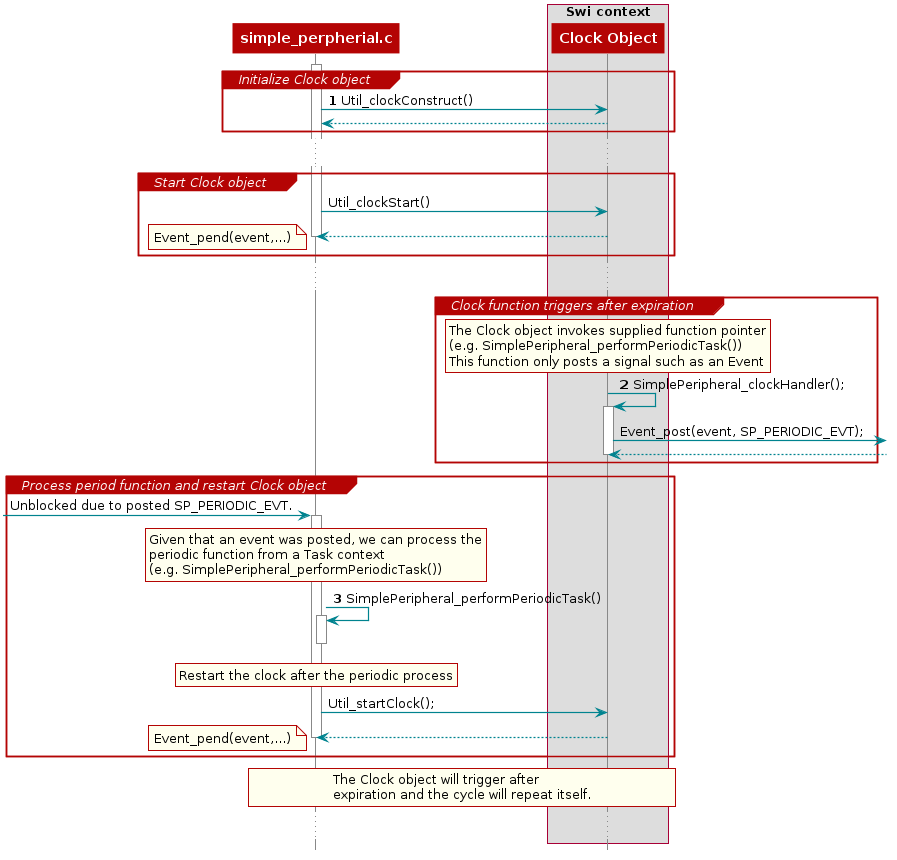Clocks¶
Clock instances are functions that can be scheduled to run after a certain
number of system ticks. Clock instances are either one-shot or periodic. These
instances start immediately upon creation, are configured to start after a
delay, and can be stopped at any time. All clock instances are executed when
they expire in the context of a Swi. The following example shows the
minimum resolution is the TI-RTOS clock tick period set in the TI-RTOS
configuration file (.cfg).
Note
The default TI-RTOS kernel tick period is 1 millisecond. For CC2640R2
devices, this is reconfigured in the TI-RTOS configuration file (.cfg):
Clock.tickPeriod = 10;
Each system tick, which is derived from the real-time clock RTC, launches a Clock object that compares the running tick count with the period of each clock to determine if the associated function should run. For higher-resolution timers, TI recommends using a 16-bit hardware timer channel or the sensor controller. See the Clock module in the package ti.sysbios.knl section of the TI-RTOS Kernel (SYS/BIOS) User’s Guide. for more information on these functions.
Note
The Sensor Controller is not available on the CC2640R2L.
You can use the Kernel’s Clock APIs directly in your application and in addition
the Util module also contains a set of abstracted TI-RTOS Clock functions as
shown here:
- Util_constructClock() creates a Clock object.
- Util_startClock() starts an existing Clock object.
- Util_restartClock() stops, restarts an existing Clock object.
- Util_isActive() checks if a Clock object is running.
- Util_stopClock() stop an existing Clock object.
- Util_rescheduleClock() reconfigure an existing Clock object.
Functional Example¶
The following example was taken from the simple_peripheral project in BLE-Stack.

Figure 34. Triggering Clock objects¶
Step 1 in Triggering Clock objects constructs the Clock object via Util_constructClock(). After the example entered a connected state, it will then start the Clock object via a Util_startClock().
// Clock instances for internal periodic events.
static Clock_Struct periodicClock;
// Create one-shot clocks for internal periodic events.
Util_constructClock(&periodicClock, SimplePeripheral_clockHandler,
SP_PERIODIC_EVT_PERIOD, 0, false, SP_PERIODIC_EVT);
Step 2 in Triggering Clock objects, after the Clock object’s timer expired,
it will execute SimplePeripheral_clockHandler() within a Swi context. As
this call cannot be blocked and blocks all Tasks, it is kept short by invoking
an Event_post(SP_PERIODIC_EVT) for post processing in simple_peripheral.
static void SimplePeripheral_clockHandler(UArg arg)
{
/* arg is passed in from Clock_construct() */
Event_post(events, arg);
}
Attention
Clock functions must not call blocking kernel APIs or TI-RTOS driver APIs! Executing long routines will impact real-time constraints placed in high priority tasks allocated for wireless protocol stacks!
Step 3 in Triggering Clock objects, the simple_peripheral task is
unblocked due the Event_post(SP_PERIODIC_EVT), where it proceeds to invoke
the SimplePeripheral_performPeriodicTask() function. Afterwards, to
restart the periodic execution of this function, it will restart the
periodicClock Clock object.
if (events & SP_PERIODIC_EVT)
{
// Perform periodic application task
SimplePeripheral_performPeriodicTask();
Util_startClock(&periodicClock);
}
